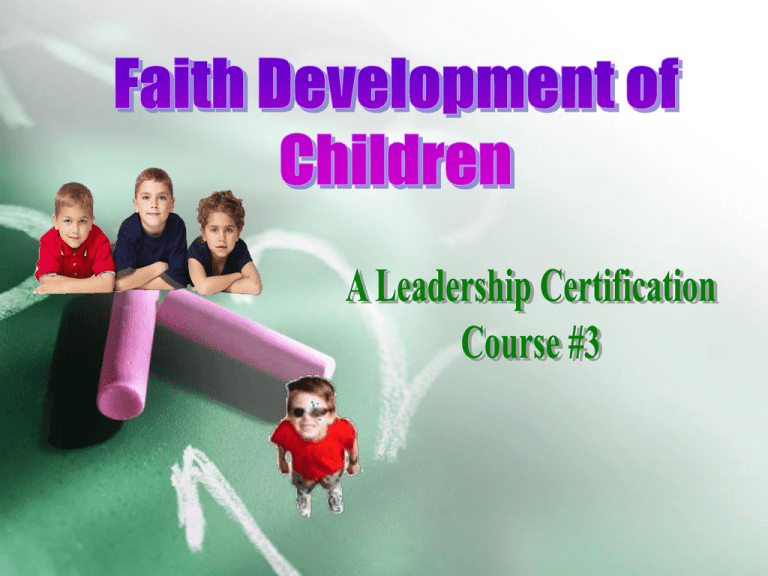Part 3. Faith Development of Children (PowerPoint file)
advertisement

Mental--“wisdom” Physical -- “stature” Spiritual--“in favor with God” Social--”in favor with man” Luke 2:52 suggests that Jesus developed in 4 areas “Faith is a living, growing relationship with God that develops and grows throughout one’s life.” Hebrew 11:1;12:2 James 2:14-26 Romans 10:17 2 Corinthians 10:15 James 1:3 Ephesians 3:17 “Let us have more confidence in our Redeemer…Have faith in God. Trustful dependence on Jesus makes victory not only possible but certain.” Ellen G. White In Heavenly Places p. 17 * Experienced faith – early childhood * Belonging faith – late primary-junior * Searching faith - teens * Owned faith – young adult Faith grows like a tree trunk. Just as you can count the rings of a trunk, so you can identify the stages of faith growth. Key: Observing & reacting Age: Early childhood Need: to experience grace > trust > love > unconditional acceptance How to foster experienced faith? > smiles, hugs & affirmation > hearing & seeing love modeled > loving discipline Key: Belonging Age: Primary/junior Needs at this level: > a sense of authority > constantly hearing the story of the community > experience awe and wonder > sense that the community --wants them --accepts them --misses them when absent How to foster belonging faith? > stories > drama > art > unconditional acceptance Key: Critical judgment Age: Teens Needs at this level: > establish identity > religion of the head balances religion of the heart How to foster searching faith? > short term journeys > serious study -- depth as well as breadth During adolescence kids get obsessed with finding themselves Parents can help by: > affirming their strengths > helping them identify and use their spiritual gifts > showing unconditional love and acceptance > helping them know Jesus as real Teachers can help by: > making Jesus/grace central to every class > getting to know kids individually > leading kids to accept Jesus “Religion of the head must be equal to religion of the heart.” John H. Westerhoff III. Accept kids’ questions about God and faith > Help them find answers > it’s okay not to know all answers > it’s okay to be scared of their questions; don’t show it Challenge them to think > ask “what if” questions > do open-ended Bible study with Bible and concordance Take kids on a journey to discover life Preferably go in a bus or van with one-way glass Allow time for them to observe Plan and prepare adequately > get the proper permission > have adequate supervision Always debrief Try these journeys with older children To the homeless > drive slowly, park by the curb awhile > let them glimpse the seamy side > stay until something happens > let them figure out ways to help/show love A one-day life journey > maternity ward and childcare > court in session or a wedding > senior care facility > emergency room & the morgue Key: conversion, witness, discipleship Age: young adults Needs at this level: > be an example --witness in word and deed > help others put faith to work How to foster owned faith? > by teaching others > by being socially responsible (service) In teaching > counselor for Pathfinders, VBS, summer camp > Sabbath School teacher or leader In witnessing Interaction with peers > giving Bible studies > peer counseling In Social Responsibility > speaking up for the social outcast > making friends with the friendless > joining community action In Service > community services volunteer > food programs > community clean-up > visiting elderly, nursing homes, fatherless families Keep in mind the entire picture of faith growth. Build a good foundation. Set the child on her own faith journey. Make your church aware of what they can do as a community to encourage faith growth. Pass on articles, books to thought leaders Don’t leave it all to the pastor. Mentor youth to teach children. Stages of Thinking “Jean Piaget’s stages of thinking have important implications for faith development.” – Steve Case Stage I Thinkers (Ages birth to two years) • A stage one thinker * Explores the world through the senses. * processes only what the senses focus on. Stage I Thinkers Experience God • Through objects that God made • Telling God “Thank You.” • Telling God, “I love you.” • Picking up on an adult’s attitude to God: > whispering God’s name > joyful worship > talking to Jesus as to a friend Stage II Thinkers (Ages two to seven) • Thinking can operate independently from senses. • Imagination knows no boundaries. • Thinking can be quite inaccurate. • Space relationships are not fully understood. • Miracles are entirely believable. • God accepted as real and His love, returned. Stage II Thinkers Learn about God • By doing—through dramatic play • By sharing and helping • By expressing joy and praise through music • By solving problems at their level of understanding • By seeing themselves in a Bible story • By applying the story to their life Stage III Thinkers (Ages seven to eleven) • Thinking centers on what is concrete & tangible • Thinking is literalistic • What is real is what is experienced— they question the reality of God • Seek first-hand confirmation of what they learn • Memorization is quick, facts easily stored • Loving God needs to be concrete— service project Stage III Thinkers (Ages seven to eleven) • Thinking centers on what is concrete & tangible • Thinking is literalistic • What is real is what is experienced— they question the reality of God • Seek first-hand confirmation of what they learn • Memorization is quick, facts easily stored • Loving God needs to be concrete— service project Stage III Thinkers Learn about God • By using their energy for God in service projects • By practical activities • By problem solving • By adult affirmation of: > God’s love > Their spiritual gifts • By understand the reason for rules • By stories of heroes and role models Stage IV Thinkers (Ages 11 through the teen years) • Gradually move from stage III to IV • Able to think about thinking • Logic & abstract thought become possible • Understand symbols instead of just memorizing them • Start questioning what they previously accepted Stage IV Thinkers Need teachers who: • listen when kids talk • Remember their own teen years • Keep their sense of humor • Don’t overreact • Truly care about kids as individuals • Avoid talking in abstract terms • Use active learning Thinking Stage & Baptism Studies show that the major age for baptism is 10-12 – stage III “Children who are baptized while they are stage III thinkers need guidance to restudy their beliefs when they reach stage IV – the age of questioning. Without help, they will still question their beliefs, but they are more likely to throw them out.” Each of Erikson’s 8 stages has its own developmental tasks Learning to trust is the first task. Mastery of each subsequent task is dependent upon master of the previous task. Tasks not mastered at the appropriate age are difficult to master later. Life stage/tasks • • • • • • • • Trust v. mistrust Autonomy v. shame/doubt Initiative v. guilt Industry v. inferiority Identity v. role confusion Intimacy v. isolation Generativity v. stagnation Integrity v. despair Inner Change Hope Will Purpose Competence Fidelity Love Care Wisdom Begin with God’s love—John 3:16, 1 John 4:8,10 Explain their need > all have sinned—Roman 3:23 > nobody impure allowed in heaven— Revelation 21:27 Explain that Jesus is the Way > whoever believe on Him—John 3:16 Help them receive Jesus >pray the sinner’s prayer—John 1:12 Give assurance of salvation— John 3:36 Reliance on Jesus—Col. 2:6 Taking time for daily: > Bible study—Jn. 3:14, Ps 119:105 > prayer—Ps. 92:1,2; 32:6 After children come to Jesus, teach them to grow in Him Seeking forgiveness—1 Jn.1:9 Making good choices—Jn.14:15 Telling others—Acts 1:8 Trusting—Jude 24 There are four imperatives for keeping youth committed after they leave children’s Sabbath School Goal-oriented spiritual training Supportive families Warm, caring church community Youth social program • • • • • Know Jesus Understand grace Learn Scripture Becoming morally responsible Relate well to the brotherhood of all believers • Witness for Christ through word and life • Involved in service • Enjoy high self-regard









